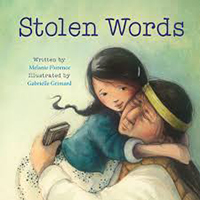Stolen Words by M. Florence
DOI:
https://doi.org/10.20361/G2T10FAbstract
Florence, Melanie. Stolen Words. Illus. Gabrielle Grimard. Second Story Press, 2017.
Stolen Words is a sensitive and thoughtful story about the legacy and intergenerational impact of Canada’s residential school system, the reclamation of language, and the tender relationship between a seven-year-old nôsisim (granddaughter) and her nimosôm (grandfather). Florence draws on her own experience for the story, having never had the opportunity to speak to her own nimosôm about his Cree heritage.
After making a dreamcatcher in school, Nôsisim goes to her nimosôm, asking how to say “grandfather” in Cree. Nimosôm replies that he “lost his words a long time ago.” He explains that he (and his words) were taken away from their home, “... to a school that was cold and lonely, where angry white faces raised their voices and their hands when we used our words.” Nôsisim wants to help Nimosôm “find your words again,” and the next day, brings home a Cree dictionary. Reading the long-forgotten words, Nimosôm’s language is reawakened, and he promises Nôsisim that he will teach her his words.
Stolen Words does not shy from the realities and long-term impacts of the residential school system. However, Florence addresses these sensitively and age-appropriately. For example, Nimosôm talks about being separated from his family. While the pain of the separation is clear, Florence’s gentle prose ensures it is not overwhelming for young readers. Also, Grimard’s illustrations are evocative, highlighting the close relationship between Nôsisim and Nimosôm, and effectively showing how Nimosôm’s language was captured (and freed) using bird imagery.
The phrasing of the sentences, and the inclusion of Cree words makes this a more appropriate read-aloud to younger readers, but it would be suitable for independent reading for students in mid-elementary school. While the subject matter is relevant for students in upper-elementary school, the text itself is below grade reading level. This book is highly recommended for both school and public libraries.
Highly recommended: 4 out of 4 stars
Reviewer: Andrea Quaiattini
Andrea Quaiattini is a Public Services Librarian at the University of Alberta’s JW Scott Health Sciences Library. While working as a camp counsellor, she memorized Mortimer and The Paper Bag Princess by Robert Munsch as bedtime stories for the kids. She can still do all the voices.

Published
How to Cite
Issue
Section
License
Authors who publish with this journal agree to the following terms:
- Authors retain copyright and grant the journal right of first publication with the work simultaneously licensed under a Creative Commons Attribution License that allows others to share the work with an acknowledgement of the work's authorship and initial publication in this journal.
- Authors are able to enter into separate, additional contractual arrangements for the non-exclusive distribution of the journal's published version of the work (e.g., post it to an institutional repository or publish it in a book), with an acknowledgement of its initial publication in this journal.
- Authors are permitted and encouraged to post their work online (e.g., in institutional repositories or on their website) prior to and during the submission process, as it can lead to productive exchanges, as well as earlier and greater citation of published work (See The Effect of Open Access).






